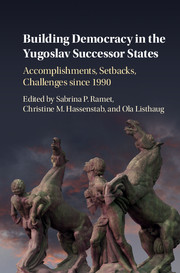 Building Democracy in the Yugoslav Successor States
Building Democracy in the Yugoslav Successor States Book contents
- Frontmatter
- Dedication
- Contents
- List of Boxes
- List of Figures
- List of Tables
- Notes on Editors
- Notes on Contributors
- Preface
- Part I Introduction and Theory
- Part II Country Studies
- 7 Building Democracy in Serbia: One Step Forward, Three Steps Back
- 8 Building Democracy in Croatia since 1990
- 9 A Durable Oligarchy: Bosnia and Herzegovina's False Post-War Democratic Transition
- 10 Liberal Democracy in Slovenia: From Seventh Heaven to the Lobby of Hell in Only Two Decades?
- 11 Macedonia's Post-Yugoslav Reality: Corruption, Wiretapping, and Stolen Elections
- 12 Building Democracy in the Western Balkans: The Case of Kosovo
- 13 The Trajectory and Parameters of Democratic Transition in Montenegro
- 14 Building Democracy in Vojvodina
- Part III Conclusion
- Further Reading
- Index
12 - Building Democracy in the Western Balkans: The Case of Kosovo
from Part II - Country Studies
Published online by Cambridge University Press: 25 May 2017
- Frontmatter
- Dedication
- Contents
- List of Boxes
- List of Figures
- List of Tables
- Notes on Editors
- Notes on Contributors
- Preface
- Part I Introduction and Theory
- Part II Country Studies
- 7 Building Democracy in Serbia: One Step Forward, Three Steps Back
- 8 Building Democracy in Croatia since 1990
- 9 A Durable Oligarchy: Bosnia and Herzegovina's False Post-War Democratic Transition
- 10 Liberal Democracy in Slovenia: From Seventh Heaven to the Lobby of Hell in Only Two Decades?
- 11 Macedonia's Post-Yugoslav Reality: Corruption, Wiretapping, and Stolen Elections
- 12 Building Democracy in the Western Balkans: The Case of Kosovo
- 13 The Trajectory and Parameters of Democratic Transition in Montenegro
- 14 Building Democracy in Vojvodina
- Part III Conclusion
- Further Reading
- Index
Summary
Kosovo, as it is referred to in English and Serbian, or Kosovë or Kosova as it is written in Albanian, is formerly a Serbian province whose independence of February 2008 sparked debates about international law and the right to secede, on the one hand, and, on the other, also put an end to the story of the dissolution of the once-united Socialist Yugoslavia. Kosovo has hence become the seventh Yugoslav successor state and has also come to be internationally identified as a precedent in achieving independence. Following the Wars of Yugoslav Succession, which includes the conflict in Kosovo from 1997 to 1999, and the international protectorate succeeding NATO's intervention of 1999, Kosovo's declaration of independence has also put an end to this province's previously unresolved status.
Unfortunate as it is, South Ossetia, Abkhazia, and very recently Crimea have shown how the issue of independence has come to represent a bitter point of disagreement not only between Western democratic states on the one hand, and those opposing Kosovo's independence, such as Russia and China on the other, but also within the Western democratic camp, since five EU states – Slovakia, Spain, Cyprus, Romania, and Greece – have still not recognized the independence of the ex-Serbian province. But after years of diplomatic failures in internationally backed negotiations in 2001 through 2008, an EU-backed diplomatic initiative was able to bring Kosovo and Serbia to an agreement (signed on 19 April 2013), which has allowed both to continue negotiations toward eventual EU membership. The Brussels Agreement of 2013 has set conditions for the normalization of relations between the two and, although Belgrade still refuses to acknowledge Priština/Prishtinë's independence, the relations between the two states are now significantly more meaningful than they were several years ago. However, serious challenges remain ahead and the legacy of disagreements and nationalist rhetoric, due to the rather harsh treatment of Kosovars under Serbian rule, and, on the other hand, persecution of local Serbs by Kosovars following the establishment of the international protectorate in 1999, have to be overcome in future years if the region is to become part of the European Union.
- Type
- Chapter
- Information
- Building Democracy in the Yugoslav Successor StatesAccomplishments, Setbacks, and Challenges since 1990, pp. 321 - 344Publisher: Cambridge University PressPrint publication year: 2017
